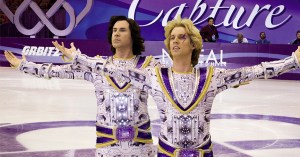How Real-Life U.S.-Russia Relations Influence The Americans Season 5
And seven more things we learned about the new season of FX's spy series from showrunners Joe Weisberg and Joel Fields.

As FX’s The Americans enters its penultimate season on Tuesday, it’s clear that more eyes are on it than ever before. Yes, because of those surprise five Emmy nominations last season, but also because audiences have read so much about the United States’ relationship with Russia — diplomatic and otherwise — on a daily basis of late.
The Americans’ story of Philip and Elizabeth Jennings (Matthew Rhys and Keri Russell) — two KGB spies posing as an average American married couple in Washington, D.C., while gathering intelligence and disposing of threats — is, by pure chance, one of the most timely tales on television today.
On a conference call with co-showrunners Joe Weisberg and Joel Fields last week, that was the main question: How will the current political climate influence the new season? Weisberg and Fields also offered plenty of other hints of what’s to come over season 5’s 13 episodes as well as in the final 10 of the series in season 6.
Rotten Tomatoes shares eight takeaways from that conversation below.
1. Current events will be kept out of the show

“We’ve had a good idea, really since season 1 where we want the show to end, and to our great surprise, that idea has stuck,” Weisberg said. “Nothing about the current situation — insane though it is — is going to alter it. Even before things blew up between the United States and Russia, we always took great pains to keep current news and current events out of the show because, look, at the end of the day, the show is taking place in the mid-’80s, and we didn’t ever want the audience to feel that we were letting the modern day interfere. We felt that would bump them out of the show.”
And in case you haven’t noticed, that includes any references to current Russian President Vladimir Putin, who was a KGB officer through the ’80s, but would otherwise really have no reason to get The Americans’ hat tip.
“We don’t want people to think we’re being clever because he’s the president of Russia now. That was a small thing [we avoided] five years ago when the show debuted,” Weisberg added. “Now the whole landscape has shifted so the thing that we’re blotting out and making sure doesn’t appear in the show is a whole political landscape. But nevertheless, we’re keeping it out.”
2. Viewer’s interpretation of the series will probably change with the times
Although the current climate won’t affect The Americans’ writers’ room, Fields said that they are “more and more aware that it’s going to affect viewers’ experience watching the show, and that’s OK because the themes are relevant and if the specific expression of the scene is getting more relevant today, that’s fine by us.” That said, he would “prefer for the world that things be less conflicted. Part of the whole idea in season 1 was that this [U.S.-Soviet] conflict was a relic of a bygone era, and so we could look at it with fresh eyes, and that could trigger us to think about why we have enemies, why we’ve become enemies, why human beings always seem to return to this tribal us-versus-them stance. We certainly could not have predicted that the very same nations would be facing off again.”
 |
3. Don’t expect an explicit “lesson” from The Americans, but there are still things to learn
While Weisberg thinks a TV show setting out to teach a lesson is “dangerous territory,” he said that his series has still maintained a central concept that is “near and dear to our hearts,” and that’s to reveal the humanity of our enemies.
“[At the time,] we called [Russia] the Evil Empire, and we thought of people in the KGB as bloodthirsty and terrible and evil in many ways. But once we thought and learned more about individual KGB officers, the picture didn’t match up in a lot of ways,” Weisberg said. “We were sort of painting this portrait of these two KGB officers that were more like probably what most of them were like, which is normal, relatable people doing their job — people that we could understand and connect with and relate to just like we would hope that people in the Soviet Union or Russia today might be able to relate to CIA officers.”
So the lesson?
“Needless to say, we feel that that applies completely today to the current conflict with Russia and that…you can gain that way of looking at the world — that people who you tend to demonize are, instead of black and white cut-outs, complex people with good sides and bad sides, and for the most part, are much more like you than you realize.”
“I would just like to add,” Fields chimed, “that one of the challenges is as we humanize people, it’s easy to think that means forgetting everything or even pretending that that somehow makes every action equal. But that’s not the case at all. All human beings live on a continuum of moral and less moral, good and darker acts. The harder it is to humanize people who are doing things that feel wrong and maybe even are wrong, the more important it may be [to humanize], because if all we do is demonize, it’s hard to imagine how we make progress.”
4. Backlash for humanizing Russian spies today wasn’t a concern
While humanizing the “enemy” was at first a concern for Weisberg and Fields, such backlash is no longer on their radar. “If [audiences are] with them by now, we feel like they’ll be with them,” Weisberg said. “We struggled with this question a lot in the first season. It was just a big unknown. Would the audience follow these characters given that they’re heroes for the other side? Can we do that? And to our surprise, people seemed to go along with it. By now, these characters are so set, [that] as neurotic as we are (and we’re a couple of neurotic writers), it actually seems like a waste of time for us to worry about that.”
5. Did those Emmy nominations affect season 5? Not really, but they were nice!

“For years, we were able to honestly say that we were just grateful to be making this show and to have passionate viewers watching it and passionate critics writing about it and to be surrounded by such a great group of collaborators, and that was all true,” Fields said. “And then we got the nominations, and it turns out, that’s really, really nice, also!”
Margo Martindale (pictured) has won the Outstanding Guest Actress in a Drama Series Emmy award twice for her role as Claudia.
6. Season 5’s subplot looks beyond the ’80s

While Weisberg admitted that season 4’s biological weapon subplot was “an obvious one that any espionage story might have picked,” it worked because of the series’ “unique and unusual take on it.”
Looking ahead to this season, Weisberg explained how he and Fields go about landing on an effective season-long storyline: “We’re just constantly doing a lot of research and studying and thinking about, indeed, current events and the times and the U.S.-Soviet conflict,” he said. “But as you see, most of the themes don’t have to slot into a particular time period of the Cold War. You could have [taken] any of [past seasons’] out and done them a couple years later or a couple years earlier, and I think that that sort of suits those season-long stories. They’re a little bigger than any particular year or any particular couple-year period, because you want your season-long story to be particularly important.”
7. Paige’s dive into the KGB will continue, and there’s more in store for Henry
Season 4 ended with Paige (Holly Taylor) becoming more and more entrenched in Elizabeth and Philip’s secret life, while tension mounts as Henry (Keidrich Sellati) is kept in the dark.The Americans showrunners can’t speak in detail on what’s to come in the season’s first episodes, of course, but they jokingly reassure that “more is in store.”
“We’re pleased to say that there’s going to be more Henry story unspooling this season,” Fields says. “And with respect to Paige, as you know from the end of last season and the beginning of this one, she’s chosen to date the one boy in the world who her parents really don’t want her to date — how universal is that?”
Expect the relationship to go into the long term.
8. Prepare for the slow burn

Despite the fact they’re going into their final 23 episodes, The Americans’ precise, but languid pacing will continue to the end, even when that end is in arm’s reach.
“I don’t think Joe and I consciously think a lot about pacing as we write,” Fields admitted. “We’re more following the story as it lays out. That said, things seem to be heating up for them.”
The Americans season 5 premieres Tuesday, March 7 on FX







